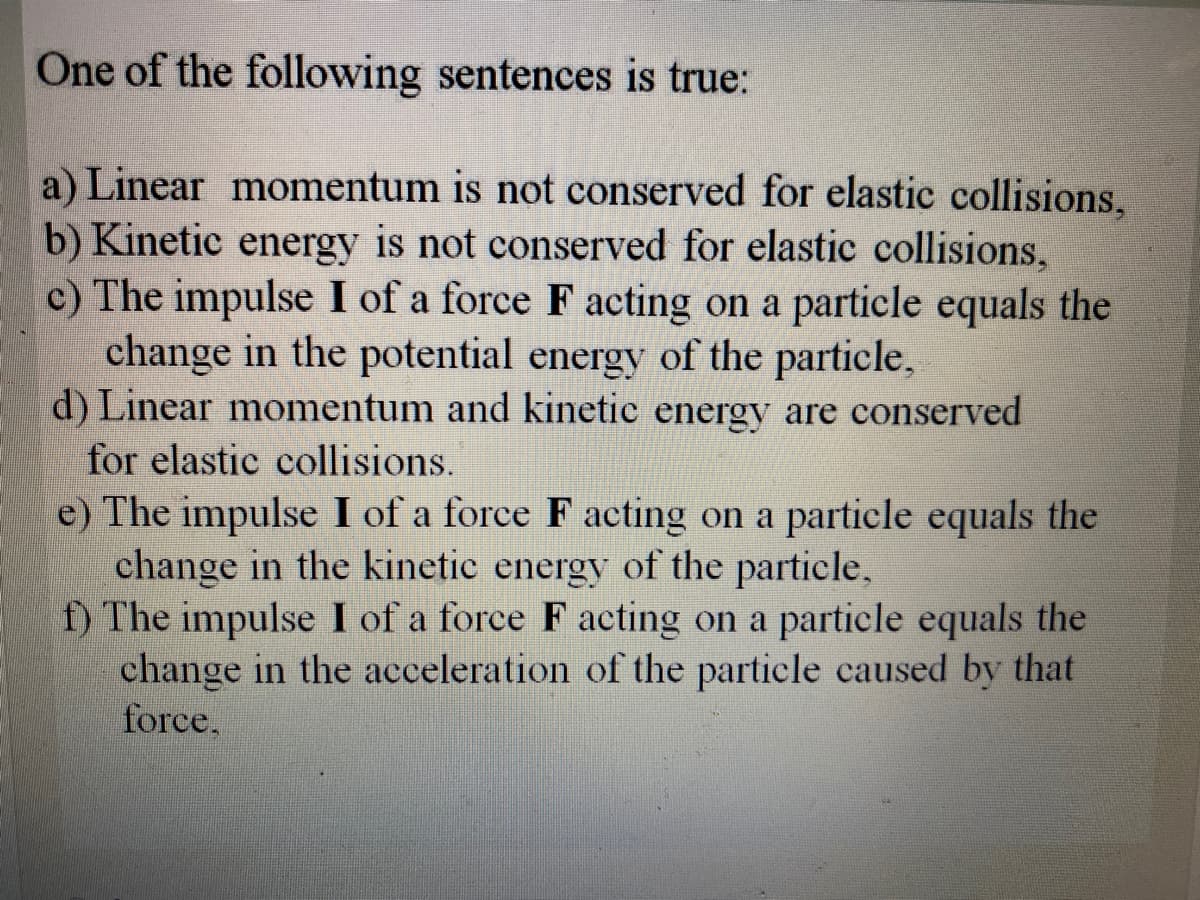One of the following sentences is true: a) Linear momentum is not conserved for elastic collisions, b) Kinetic energy is not conserved for elastic collisions, c) The impulse I of a force F acting on a particle equals the change in the potential energy of the particle, d) Linear momentum and kinetic energy are conserved for elastic collisions. e) The impulse I of a force F acting on a particle equals the change in the kinetic energy of the particle, f) The impulse I of a force F acting on a particle equals the change in the acceleration of the particle caused by that force,
One of the following sentences is true: a) Linear momentum is not conserved for elastic collisions, b) Kinetic energy is not conserved for elastic collisions, c) The impulse I of a force F acting on a particle equals the change in the potential energy of the particle, d) Linear momentum and kinetic energy are conserved for elastic collisions. e) The impulse I of a force F acting on a particle equals the change in the kinetic energy of the particle, f) The impulse I of a force F acting on a particle equals the change in the acceleration of the particle caused by that force,
Physics for Scientists and Engineers with Modern Physics
10th Edition
ISBN:9781337553292
Author:Raymond A. Serway, John W. Jewett
Publisher:Raymond A. Serway, John W. Jewett
Chapter9: Linear Momentum And Collisions
Section: Chapter Questions
Problem 10P: The magnitude of the net force exerted in the x direction on a 2.50-kg particle varies in time as...
Related questions
Question

Transcribed Image Text:One of the following sentences is true:
a) Linear momentum is not conserved for elastic collisions,
b) Kinetic energy is not conserved for elastic collisions,
c) The impulse I of a force F acting on a particle equals the
change in the potential energy of the particle,
d) Linear momentum and kinetic energy are conserved
for elastic collisions.
e) The impulse I of a force F acting on a particle equals the
change in the kinetic energy of the particle,
f) The impulse I of a force F acting on a particle equals the
change in the acceleration of the particle caused by that
force,
Expert Solution
This question has been solved!
Explore an expertly crafted, step-by-step solution for a thorough understanding of key concepts.
Step by step
Solved in 3 steps

Knowledge Booster
Learn more about
Need a deep-dive on the concept behind this application? Look no further. Learn more about this topic, physics and related others by exploring similar questions and additional content below.Recommended textbooks for you

Physics for Scientists and Engineers with Modern …
Physics
ISBN:
9781337553292
Author:
Raymond A. Serway, John W. Jewett
Publisher:
Cengage Learning

Principles of Physics: A Calculus-Based Text
Physics
ISBN:
9781133104261
Author:
Raymond A. Serway, John W. Jewett
Publisher:
Cengage Learning

College Physics
Physics
ISBN:
9781285737027
Author:
Raymond A. Serway, Chris Vuille
Publisher:
Cengage Learning

Physics for Scientists and Engineers with Modern …
Physics
ISBN:
9781337553292
Author:
Raymond A. Serway, John W. Jewett
Publisher:
Cengage Learning

Principles of Physics: A Calculus-Based Text
Physics
ISBN:
9781133104261
Author:
Raymond A. Serway, John W. Jewett
Publisher:
Cengage Learning

College Physics
Physics
ISBN:
9781285737027
Author:
Raymond A. Serway, Chris Vuille
Publisher:
Cengage Learning

Physics for Scientists and Engineers: Foundations…
Physics
ISBN:
9781133939146
Author:
Katz, Debora M.
Publisher:
Cengage Learning

Physics for Scientists and Engineers
Physics
ISBN:
9781337553278
Author:
Raymond A. Serway, John W. Jewett
Publisher:
Cengage Learning

University Physics Volume 1
Physics
ISBN:
9781938168277
Author:
William Moebs, Samuel J. Ling, Jeff Sanny
Publisher:
OpenStax - Rice University